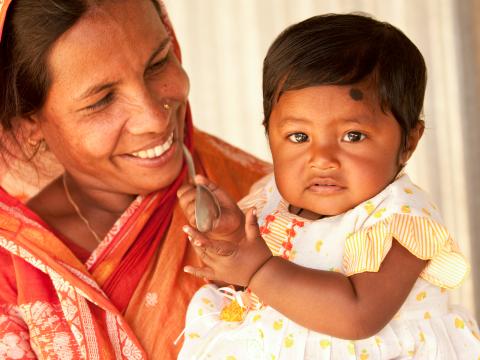‘Finishing the job’ – ending preventable child deaths by addressing newborn mortality

By: Emma Edwards, Campaign Advisor – Child Health Now, World Vision International
I recently had the opportunity to spend time with World Vision staff in Bangladesh, working with mothers and children in communities in which the Child Health Now campaign is being implemented. Bangladesh is the friendliest country I have ever visited! In addition to my warm welcome, I was encouraged with the progress the country has made to improve the health of women and children, despite limited resources and a challenging socio-economic context that is at time also compounded by natural disasters.
Bangladesh is one of only a handful of countries to reduce its under-five mortality rates by two thirds or more since 1990 and is ‘on track’ to meet Millennium Development Goal (MDG) 4 and 5 related to child and maternal health respectively. However, despite this remarkable achievement, significant challenges remain. Today, more than 75,000 babies born in Bangladesh each year die during their first month of life. Most of these deaths are preventable and the majority take place in the lead up to, during or the days following birth, when most maternal deaths also occur. The majority of these maternal and newborn deaths could be avoided if all women had access to a skilled birth attendant. Sadly, most women in Bangladesh give birth at home without the critical care and attention of a skilled birth attendant. For Bangladesh to be able to reach further towards ending preventable maternal and child deaths, it is critical to invest in care at the time of birth.
On the global scale significant strides in reducing under-five mortality have been made, albeit at a slower rate of progress that we had hoped for. But neonatal deaths are not reducing at anywhere near the same rate. In fact, the proportion of newborn deaths as a share of under-five child deaths is increasing – more than 40% of all under-five child deaths occur in their first month of life.
2014 – A critical year for newborn health
As we approach the 2015 deadline of the Millennium Development Goals, and as the next set of development goals is formulated through the Post-2015 development framework, it is critically important that we ‘go beyond the MDGs’ to ensure the poorest and most marginalised people are included in the next development framework – thereby ensuring efforts are focused on the groups that are being left behind. The forthcoming World Health Assembly offers a critical opportunity for Health Ministers to demonstrate collective political will in support of saving newborn lives by passing the resolution on the Every Newborn Action Plan. The Plan’s recommendations and proposed targets offer a framework for saving the lives of millions of newborns and it is a powerful means to dramatically improve the survival of children during their first month of life, while radically reducing the number of stillbirths. It offers a roadmap for change - focusing on care at the time of birth; aiming to count every newborn at birth; involving communities in improving newborn health; and aiming to reach every woman and child with quality care.
For Bangladesh, and a handful of other countries on track to reach MDG 4, the Plan offers a key opportunity. National governments can continue their leadership toward improving maternal and child health by endorsing the Every Newborn Action Plan and committing to implementing the plan in order to dramatically improve the survival of children within their first month of life.
Right now, we also have an opportunity as individuals and citizens and as a global community. In recognition that we need to ‘go beyond the MDGS’ and reach further to end all preventable maternal and child deaths in the Post-2015 development framework, World Vision's Child Health Now campaign and partners will mobilise children and communities around the world for the Global Week of Action from 1st- 8th May, 2014. Together, we will call for accelerated action on MDGs 4 & 5, highlighting the need to reach the unseen, uncounted and invisible children, those that are vulnerable and marginalised and living life on the margins. Like those in Bangladesh, where World Vision is serving more than 5 million people, including 1 million children in 35 districts across the country. We would like to work with as many partners as possible; to see our calls echoed across the whole spectrum of maternal, newborn and child health and nutrition. You can take action in a number of ways as an individual or through your organisation.